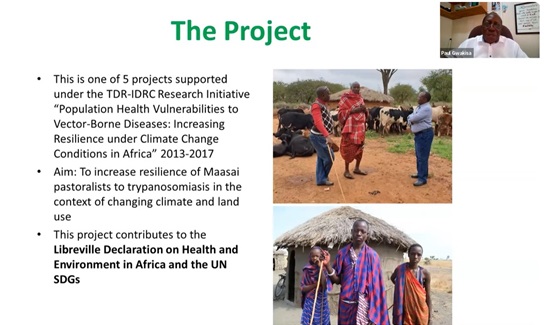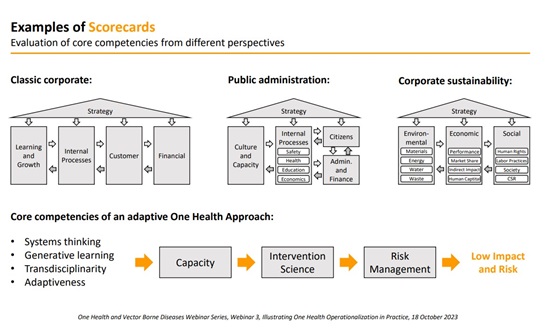

This webinar series aims to provide a platform that allows for sharing of relevant research, lessons learnt, ideas and innovation. This network of individuals will come together to discuss various relevant research themes around One Health, climate change and vector-borne diseases. This series will provide the space to share challenges and learn from each other’s experiences, while working towards the common goal of more effective and efficient VBD prevention and management.
Through this initiative we hope to foster greater collaboration, to build upon each other’s initiatives and activities and create a greater impact and outreach while promoting quality research. With the belief that the inclusive and holistic One Health approach is the way forward for the future, we wish to develop a shared understanding of One Health and an understanding and awareness on how best to prevent and manage VBDs in various settings, especially in the Global South.
The first webinar was held on 7 March 2023. The objective of this webinar was to bring together all consortia of the four proposals selected to address One Health implementation research priorities for VBDs in the context of climate change.
All four project teams presented their research projects, describing their objectives and methodology, how the study takes a holistic One Health approach, expected/desired outcomes, challenges and current status. Inputs were provided by colleagues, and discussions were held around the importance of integrated One Health implementation and policy uptake.
Links to project consortia presentations (PDF format)
- Uganda-Kenya : Leishmaniasis
- Senegal-Nigeria : Mosquito-borne diseases
- Rwanda-Tanzania : Fasciolosis and schistosomiasis
- South Africa-Rwanda : Schistosomiasis
The focus of this webinar was on the One Health Joint Plan of Action (OH JPA). This document has been developed by the quadripartite which consists of four organizations: the Food and Agriculture Organization of the United Nations (FAO), the United Nations Environment Programme (UNEP), the World Organisation for Animal Health (WOAH, founded as OIE), and the World Health Organization (WHO). The OH JPA was presented to familiarize all with its 6 action tracks, with a special focus on action track 3 that focuses on zoonotic, vector-borne and neglected tropical diseases.
Discussions were focused on an understanding of One Health at a global level, as well as the challenges faced during uptake and implementation of an integrated inclusive multidisciplinary approach, at national as well as global level.
The objective of this webinar was to bring forth lessons learnt from past projects and experiences and to provide participants with a well-rounded and mature understanding of the One Health approach. A recent publication from a past project (2018-2022), a collaboration between TDR, Global Health Group International (GHGI) and Sokoine University of Agriculture, explored the pillars for successful operationalization of the One Health approach. This was followed up with a presentation on the development of the One Health scorecard.
Discussions focused on understanding through a real-life example of assessing actions and interventions for successful and sustainable One Health implementation. Discussions on the scorecard development further clarified the different steps of the transdisciplinary approach required for One Health operationalization. All project teams have also been given the opportunity to apply the scorecard to assess their projects and further enhance it by supplementing where the gaps may be present.
Watch the presentations
This webinar was one of a series of events that TDR organized to share the findings and lessons from its One Health research projects in Africa. The webinar focused on two of the four ongoing projects.
The Uganda-Kenya team presented their Leishmaniasis study, which involved sampling human and dog hosts, community engagement and a course conducted on One Health and Leishmaniasis.
Rwanda team presented their results on the prevalence of schistosomiasis and fascioliasis in humans and livestock, the snail vector populations, the snail species and the community awareness.
Both studies used climate data to analyse the linkages and the disease trends. The webinar also discussed the research gaps and the future directions.
Another presentation was from AFROHUN, a network of universities that supports One Health education and capacity building in the region. The presentation gave an overview of the network, its objectives and its approach to workforce development. It also introduced the AFROHUN One Health Academy and its courses and training programmes.
Watch Tanzania - Rwanda presentation
Watch Uganda - Kenya presentation
The webinar was conducted to present the study results of the Senegal-Nigeria One Health project team. Although the project is still ongoing, it is scheduled to be completed by December 2024. Having collected, collated, and analyzed the majority of their data, the team presented their findings.
The first presentation provided an overview of the project objectives and methodology, followed by an explanation of the monthly trends observed in climate and malaria. The impact of climate on malaria was elucidated, emphasizing the relevant climate variables. Model frameworks and outputs for malaria, as well as dengue, were showcased, mapping potential risks.
The second presentation delved deeper into the impact of climate change on dengue and malaria cases. It summarized and discussed trends related to current and projected temperature changes, rainfall patterns, and disease incidence.
The final presentation offered insights into the surveillance of vector species and potential arboviral vectors, highlighting species presence, occurrence, feeding patterns, and biting behaviors.
The webinar concluded with discussions on identified research gaps and future scope.
Presentations:
The webinar was conducted to present the study results of the South Africa-Rwanda One Health (OH) project team. This project is divided into three phases. Phase one looks at a systematic review of One Health intervention implementation metrics. Phase 2 looks at developing metrics for the evaluation of OH-based schistosomiasis prevention and control programmes.Both of these phases have been completed by the team and their results were discussed during the webinar.
Phase 3 of the project is scheduled to be completed by early- to mid-2025. This phase looks at developing a step-by-step OH implementation guide relevant for the prevention and control of schistosomiasis. This phase will also investigate the effects of the interventions on the implementation success for the prevention and control of schistosomiasis in the context of climate change in Africa.
Discussion was held around the future actions of phase 3 of the project and how this study will help contribute to the successful operationalization of the OH approach and help advance knowledge and policies with regard to the control of vector-borne diseases and more specifically schistosomiasis.
Operationalisation Metrics for evaluating implementation of One Health Interventions in the Context of Vector-Borne Diseases and Climate Change: A Systematic Scoping Review.
Next steps
Phase 2: Developing metrics



